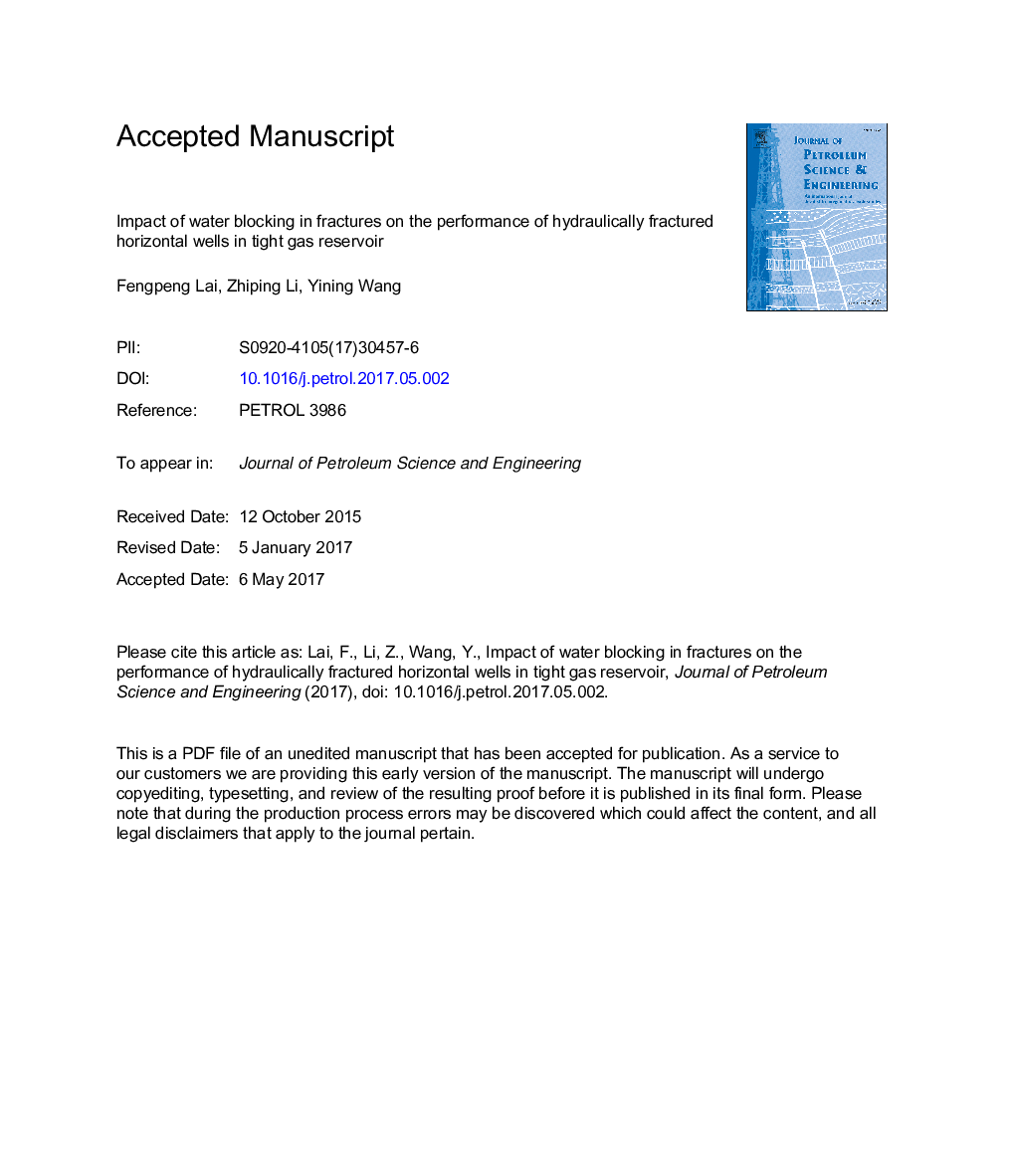| کد مقاله | کد نشریه | سال انتشار | مقاله انگلیسی | نسخه تمام متن |
|---|---|---|---|---|
| 5484095 | 1522785 | 2017 | 19 صفحه PDF | دانلود رایگان |
عنوان انگلیسی مقاله ISI
Impact of water blocking in fractures on the performance of hydraulically fractured horizontal wells in tight gas reservoir
ترجمه فارسی عنوان
تأثیر مسدود شدن آب در شکستگی ها بر عملکرد چاه های افقی شکستگی هیدرولیکی در مخزن گاز تنگ
دانلود مقاله + سفارش ترجمه
دانلود مقاله ISI انگلیسی
رایگان برای ایرانیان
کلمات کلیدی
مسدود کردن آب شکستگی هیدرولیکی، رطوبت ویسکوزیته مایع شکستگی، فیلتراسیون مایع شکستگی،
ترجمه چکیده
گاز تنگ یک منبع گاز عمده است که 14 درصد کل منابع گاز و 29 درصد گاز غیر متعارف در جهان را تشکیل می دهد. تولید طبیعی مخزن تنگ بسیار پایین است و تکنولوژی شکست چند مرحله ای به طور گسترده ای در چاه های افقی مورد استفاده قرار می گیرد. شکستگی هیدرولیکی چند مرحله ای برای تحریک مخازن گاز تنگ نیاز به مقدار قابل توجهی از مایع شکستگی دارد که معمولا بر پایه آب است. مسدود کردن آب به عنوان یک نوع آسیب بالقوه در مخازن گاز تنگ محسوب می شود. عوامل متعددی موثر بر کاهش تولید ناشی از مسدود شدن آب در شکستگی ها هستند. با این حال، مسدود شدن آب و جداسازی مایع در شکستگی ها نادیده گرفته می شود. این مطالعه به بررسی ویژگی های مسدود شدن آب در شکستگی ها و اثرات رطوبت، ویسکوزیته مایع شکستگی و فیلتراسیون مایع شکستگی بر روی مسدود کردن آب و تولید گاز می پردازد. شبیه سازی عددی برای نشان دادن استفاده از سه مرحله برای توصیف تغییر اشباع آب در بالا و پایین شکستگی ها، جایی که مرحله دوم نشان می دهد مسدود شدن آب در شکستگی های هیدرولیکی است. نتایج نشان می دهد که قوی تر بودن تنش بین فاز، آشکار شدن آب پذیری آب و تله های آب بیشتری در ماتریس مخزن است. کاهش تنش بین فضای باز بهبود بار را بهبود می بخشد، آسیب شکل را کاهش می دهد و تولید گاز را افزایش می دهد. ویسکوزیته مایع شکستگی بالاتر باعث ایجاد تله های آب بیشتر در انتهای شکستگی می شود و آسیب های شکل گیری را در چاه های گاز محکم افزایش می دهد. نتایج نشان می دهد که فیلتراسیون مایع شکستگی تأثیر زیادی بر عملکرد جریان و تولید گاز بعدی دارد. نتایج نشان می دهد که افزایش ضریب کیک فیلتر، مقدار حداکثر تولید گاز را کاهش می دهد و زمان را نشان می دهد که میزان تولید گاز را افزایش می دهد و تولید گاز تجمعی را کاهش می دهد.
موضوعات مرتبط
مهندسی و علوم پایه
علوم زمین و سیارات
زمین شناسی اقتصادی
چکیده انگلیسی
Tight gas is a major gas resource which accounts for 14% of the total gas resources and 29% of unconventional gas in the world. The natural production of tight reservoir is very low, and multi-stage fracturing technology is widely used in horizontal wells. Multi-stage hydraulic fracturing for stimulating tight gas reservoirs requires a significant amount of fracturing fluid, which is usually water-based. Water blocking is considered as a potential type of damage in tight gas reservoirs. There are many factors affecting the production decline caused by the water blocking in fractures. However, the water blocking and fluid segregation in fractures are ignored. This study investigates the characteristics of water blocking in fractures and the effects of wettability, fracture fluid viscosity and fracture fluid filtration on water blocking and gas production. Numerical simulation is used to show that three stages can be used to describe the change of water saturation at the top and bottom of fractures, where the second stage indicates water blocking in hydraulic fractures. The results demonstrate that the stronger the interfacial tension, the more obvious the water wettability is, and the more water traps in the reservoir matrix. Decreasing interfacial tension improves the load recovery, and reduces the formation damage, and further enhances the gas production. A higher fracturing fluid viscosity causes more water traps at the bottom of fractures and intensifies the formation damage on tight gas wells. Results indicate that the fracturing fluid filtration has a great impact on the flowback performance and later gas production. Results suggest that increasing the filter cake thickness decreases the gas production peak value, and delays the time showing the peak of gas production, and further reduces the cumulative gas production.
ناشر
Database: Elsevier - ScienceDirect (ساینس دایرکت)
Journal: Journal of Petroleum Science and Engineering - Volume 156, July 2017, Pages 134-141
Journal: Journal of Petroleum Science and Engineering - Volume 156, July 2017, Pages 134-141
نویسندگان
Fengpeng Lai, Zhiping Li, Yining Wang,
